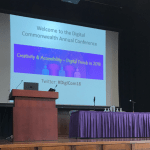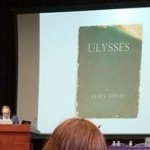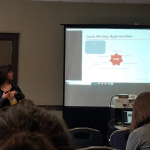The Digital Commonwealth awarded three students free attendance to the annual conference this year. All three have written blog posts about their experience. We are happy to present the third of these reports today.
Jacob Loberti is our third student correspondent. A sophomore at Wheaton College in Norton, Massachusetts, Jacob is majoring in Computer Science with a minor in Business.
An Undergrad on a Mission: Attending the Digital Commonwealth Annual Conference to Survey for an Independent Study

On Tuesday, April 10th I attended the 12th annual Digital Commonwealth conference at The College of the Holy Cross. I differ slightly from the regular attendee as I come bearing a different lens, that of a budding computer scientist. I decided to attend the Digital Commonwealth conference as a result of my independent study at Wheaton College. My independent study is a so-called Special Interest Group (SIG) project designed to be an interdisciplinary course of study amongst my other classes this semester. My two other group members and I have titled our SIG this semester, “3D Modeling to Virtual Viewing: Digitizing Wheaton’s African Collection”. In this project, we used a technique called photogrammetry to create virtual models to preserve Wheaton’s Permanent Collection. We found this conference to be quite relevant to what we had been working on since the beginning of the semester. When we first arrived at the Digital Commonwealth conference, we were presented with a delicious continental breakfast (we would later be served a warm lunch) to tide us over until the welcome remarks.
One notable session was certainly the keynote address, where Professor Joseph Nugent gave a presentation of his latest project, Joycestick, a “gamefiction” of Ulysses by James Joyce. I found this presentation fascinating and actually quite relevant to my group’s SIG project – except obviously done on a much larger scale with some great resources along with some graduate students at Boston College. Another session I found interesting was the networking session where my group partner and I got to speak directly with Professor Nugent. We showed him our SIG project and how far we had come since the beginning of the semester. He seemed rather impressed. What I soon found out about Professor Nugent was that he was a truly genuine person; he was more than happy to share some of his successes and failures with us, along with some tips that we could use for success as we continued and wrapped up our semester-long project. Our talk with Professor Nugent was probably the highlight of my day.
All in all there was a lot going on April 10th, but I’d say there was definitely a common theme in the air of the 12th annual Digital Commonwealth conference. This theme was one of Evolution as the greatest archivists in Massachusetts gather to discuss and master the art of preserving their historical pieces beyond the realm of the physical, and to keep doing so for many years to come.

